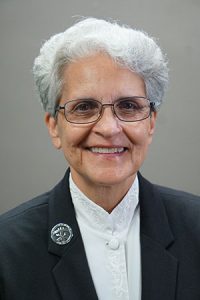
Sister Ann Joachim Wolcenski, OSF
July 11, 2022
Celebrating Feasts of Mary
August 1, 2022By Sister Nancy Linenkugel
Have you ever noticed the fine print information on a tuna can? No, I didn’t either until recently when I was tossing an empty can into the recycling bin.
From the picture (above) there are these facts:
- The tuna contents came from either the Indian Ocean or the Pacific Ocean
- The tuna was caught by the Purse Seine method
- (almost out of view) The tuna contents are “best if consumed by January 2024” but if you open the can you should eat the tuna within two days.
A purse seine method sounds efficient and humane. A large circular net with weights around the bottom is placed amid a school of fish (mainly tuna, sardines or mackerel) and the drawstring at the bottom of the net is pulled to tighten it like a purse. The whole net is hauled aboard; any smaller species are returned to the ocean in order to keep growing and to replenish the supply.
I’m reminded of the lyrics to “Frosty the Snowman” – “there must have been some magic in that old silk hat they found.” There also must be some magic that happens within the tuna can. If the contents overall are good for two years but only good for two days once the can is opened, can we infer anything from that? Obviously, the tuna is safe and nutritious in the closed, protected, and surrounded environment of the tin can. Only when the can is open – subjecting it to air and many other forces – does the tuna have limited life and could spoil.
Is there a similar lesson in life? If I keep myself safe, uninvolved, and isolated I might last longer. But what kind of a life am I living? Where’s the mission in that? As Aristotle said, “There is only one way to avoid criticism: do nothing, say nothing, be nothing.”








More than I can handle about the label on the tuna can!
I’m always impressed when I see folks catch tuna on TV…they are HUGE.
Can get a lot of cans of tuna from just one tuna fish!!!
Thanks for your observations and insight…gives me something to think about!
A very interesting parallel — the life of the tuna after it’s caught and dead, I might add, and mine while still alive and can make choices. The tuna did what it was created to do, be of service to others as food. How I serve others makes all the difference in my life. Thanks, Nancy!
Great life lesson, Sister Nancy and more information than I have ever known about tuna. Thanks for sharing your insights.